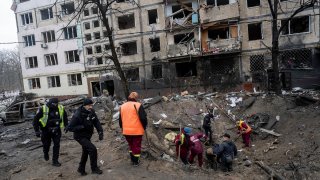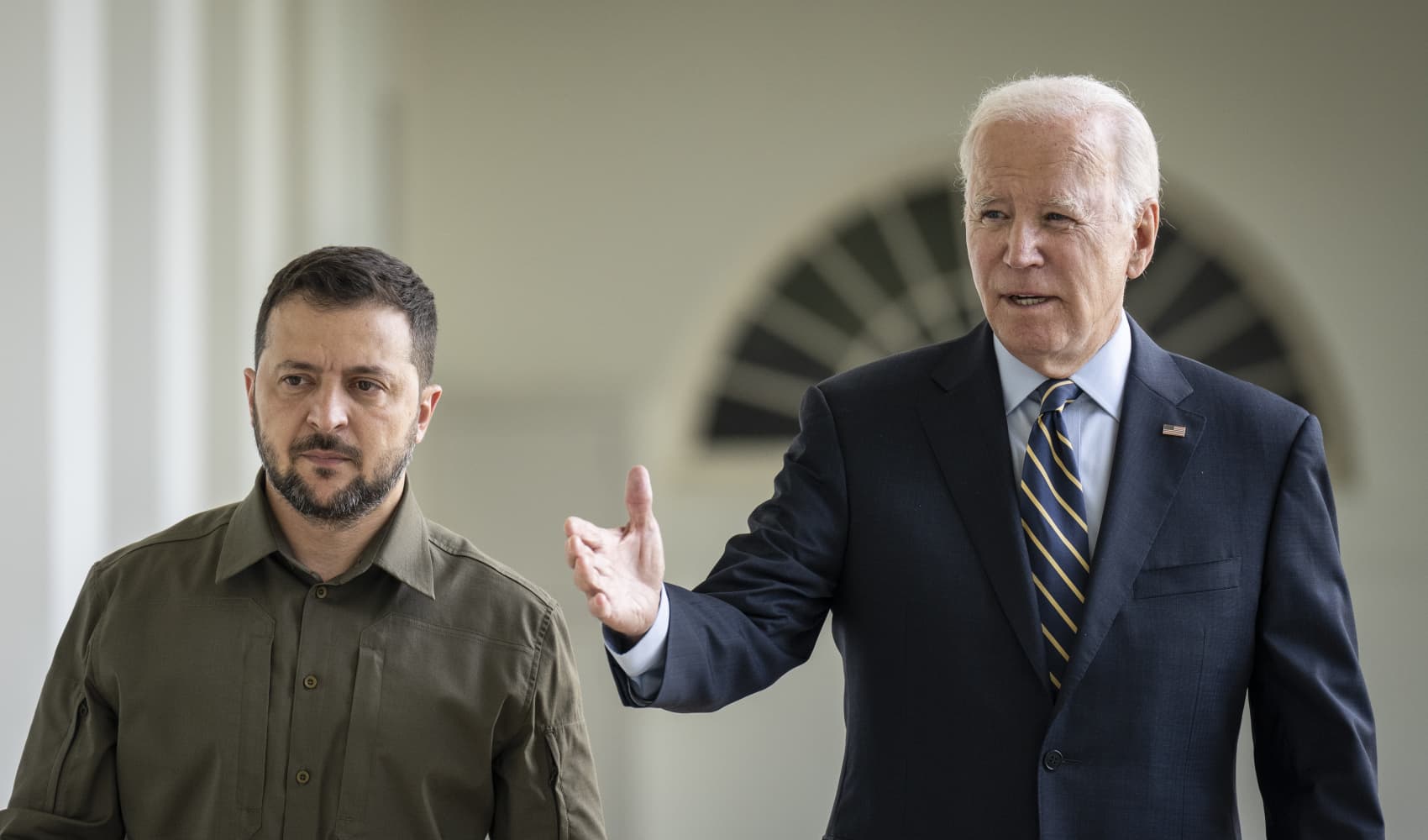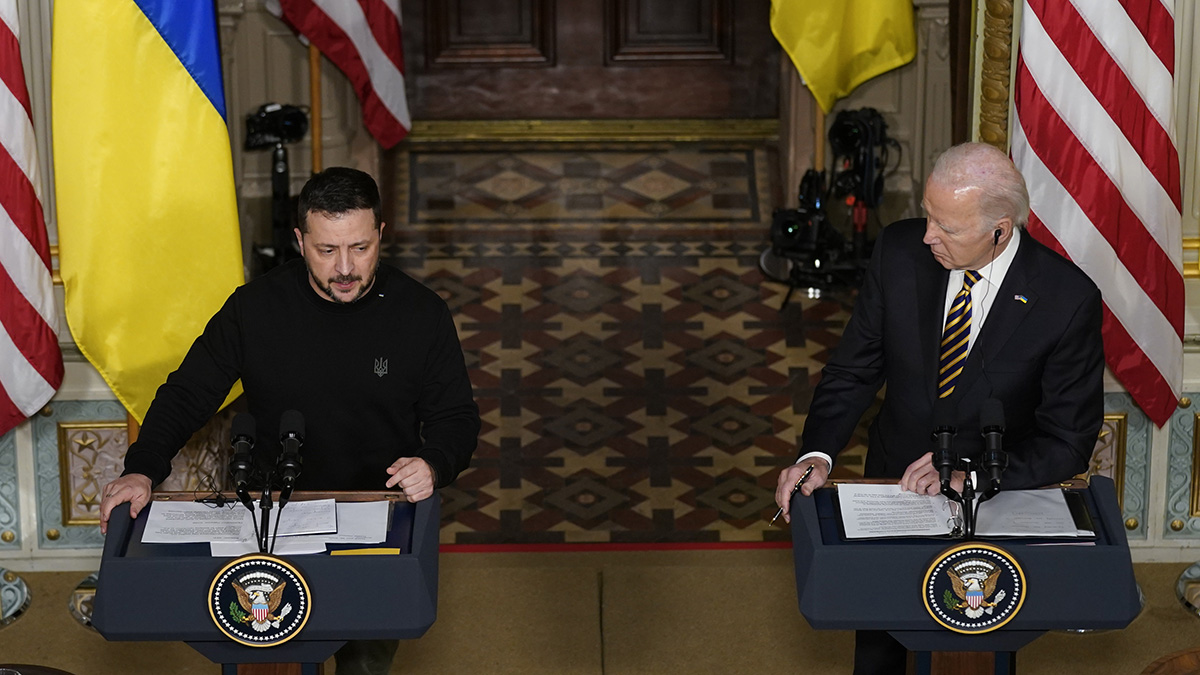
Ukraine’s capital came under another ballistic missile attack early Wednesday, injuring at least 53 people on the ground, including six children, and damaging buildings, officials said.
A series of loud explosions could be heard in Kyiv at 3 a.m. local time as the city's air defenses were activated for the second time this week. Ukraine’s air force said Russia launched 10 ballistic missiles toward the capital and all were intercepted by air defenses.
The attack on the capital underscored the continuing threat to Ukraine from the Kremlin’s missile arsenal in the 21-month war. Russia has in recent months been stockpiling its air-launched cruise missiles from its heavy bomber fleet, according to a recent assessment by the U.K. Ministry of Defense.
That may herald another heavy winter bombardment of Ukraine’s power grid. Moscow last year targeted energy infrastructure in an effort to deny Ukrainians heat, light and running water and break their fighting spirit.
Get top local stories in Southern California delivered to you every morning. Sign up for NBC LA's News Headlines newsletter.
Ukraine has dwindling supplies of air defense munitions and other ammunition. That prompted Ukrainian President Volodymyr Zelenskyy to visit Washington on Tuesday in an effort to persuade lawmakers to approve President Joe Biden's request for $61.4 billion for Ukraine.
Zelenskyy on Wednesday arrived in Norway to meet Nordic leaders gathered for a regional meeting focusing on cooperation in security and defense issues. Senior leaders from Denmark, Iceland, Norway, Finland and Sweden — among Kyiv's staunchest supporters — attended.
“We are in a critical phase where Europe must continue to show its support," Danish Prime Minister Mette Frederiksen said in a statement. "We must be tireless in our help.”
Debris from intercepted missiles fell in Kyiv's eastern Dniprovskyi district, injuring at least 53 people, Kyiv Mayor Vitali Kitschko said on Telegram. Twenty people, including two children, were hospitalized, and 33 people received medical treatment on the spot.
An apartment building, a private house and several cars caught fire, while the windows of a children's hospital were shattered, Klitschko said. Falling rocket debris also damaged the water supply system in the district.
It wasn't immediately clear what type of missile was used in the Kyiv attack.
“It is difficult to imagine the consequences of these attacks if we don’t have air protection,” Ukraine’s Minister of Economy, Yulia Svyrydenko, said on X, formerly Twitter. “Each attack emphasizes the urgent need for more protection, as Russia shows no intention of stopping.”
In other parts of Ukraine, 10 Russian drones were shot down, most of them in the Odesa region, the Ukrainian air force said.
On Monday, a Russian missile attack destroyed several homes on the outskirts of Kyiv and left more than 100 households temporarily without electricity.
Wednesday's attack came as Zelenskyy visited Washington, where he made an impassioned plea to Congress to approve additional aid to fight Russia’s invasion.
Andriy Yermak, Zelenskyy's chief of staff who was traveling with the president, said the interception of the missiles fired at Kyiv showed how Western support is helping Ukraine resist the Russian aggression.
“The effectiveness of Western weaponry in the hands of Ukrainian soldiers is beyond doubt,” Yermak wrote on Telegram.
As winter sets in and hampers troop movements, allowing little change along the front line, air bombardment plays a growing role in the war. Ukrainian officials have warned that Russia will target energy infrastructure to cause power outages and blackouts like it did last winter.
Cyberattacks are also a busy battleground. Ukrainian telecom provider Kyivstar, which serves more than 24 million mobile customers across the country, said its services were disrupted Tuesday by a “powerful” attack by hackers. It also disrupted the air raid warning system in part of the Kyiv region, according to the head of the Kyiv regional administration, Ruslan Kravchenko.
___
Associated Press reporters Jan M. Olsen in Copenhagen, Denmark and Yuras Karmanau in Tallinn, Estonia contributed.



